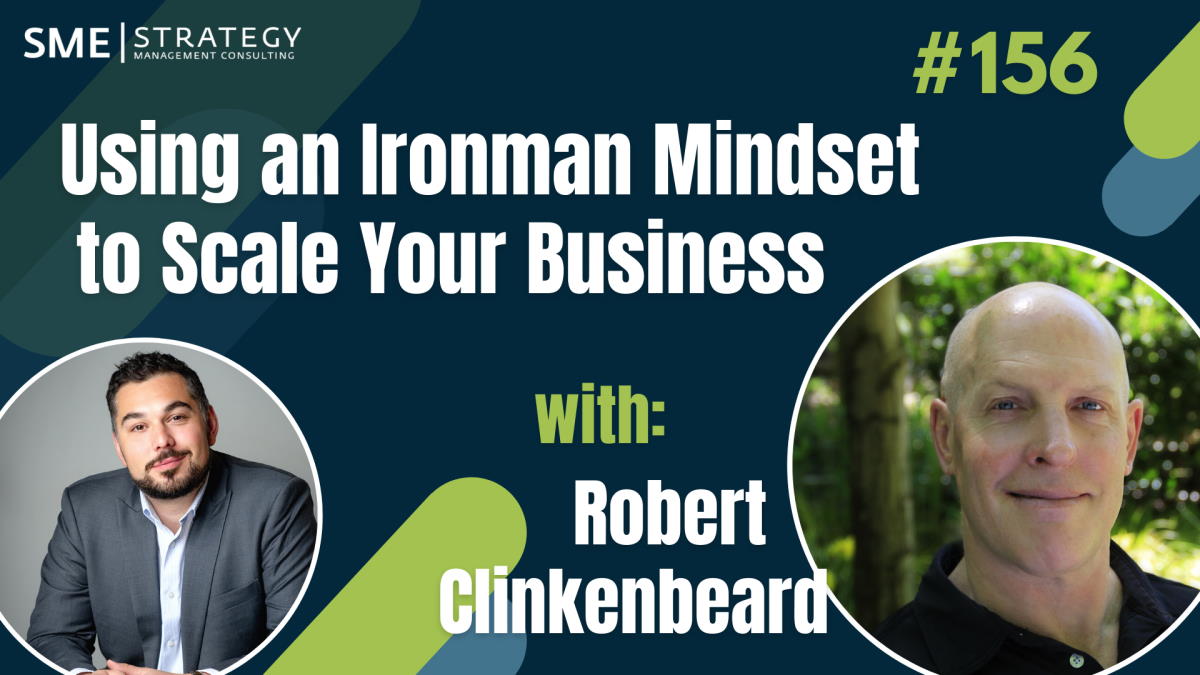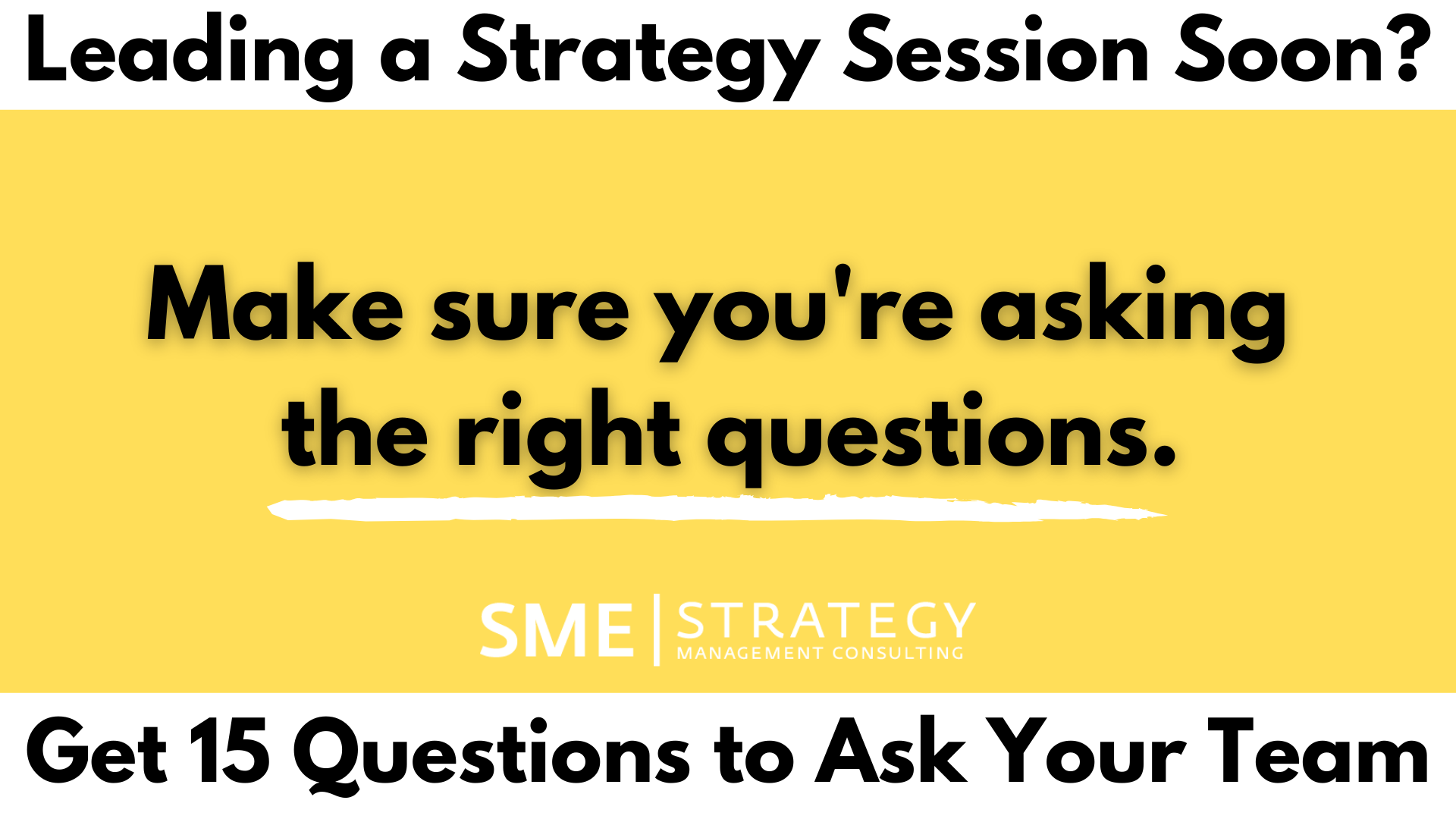Using an Ironman Mindset to Scale Your Business w/Robert Clinkenbeard Ep#156

SME Strategy is a strategy consulting company that specializes in aligning teams around their vision, mission, values, goals and action plans. Learn more about how we can help align your team with our strategic planning and implementation services.
 Anthony: Welcome, folks to this episode of the Strategy & Leadership Podcast. My name is Anthony Taylor. I'm excited to have you here. My guest today is Robert Clinkenbeard, who is the owner of the Radix Group. Robert, how are you?
Anthony: Welcome, folks to this episode of the Strategy & Leadership Podcast. My name is Anthony Taylor. I'm excited to have you here. My guest today is Robert Clinkenbeard, who is the owner of the Radix Group. Robert, how are you?
 Robert: Good, thanks. How are you?
Robert: Good, thanks. How are you?
Anthony: I'm fantastic. I'm excited to finally get to chat. I'm excited to hear about all the cool things you're doing. So I know you got a couple things on the go. But why don't you tell our audience a little bit about you and who you are and how you got to where you're at right now?
Robert: Yeah, for sure. You can tell by that accent, I'm originally from Edinburgh, Scotland. I moved across in 99, to Arizona, started up my commercial landscape company, grew that from scratch, and grew to $20 million, 350 employees. Then I just start having some bad partnership issues. So I thought, you know, life's too short. So I sold that business. Now, I have developed a coaching company that works with CEOs, entrepreneurs, companies all around the world actually. I really enjoy being able to help other people, just to share the experience. And yeah, I love it. I love it.
Anthony: Very cool. And I see in the back, it says scaling up and EOS advisor as we build our process. Those two systems are amazing help you scale up and the operating system to grow a company. So if we think back to when you had your landscaping business, what were some of the key factors that contributed to your success in being able to get it from, you know, brand new startup to having as many people and as much revenue as you did?
Robert: Yeah, good question. I think probably the primary thing is having the right people in place. I think initially, I've tried to do everything. And it just, it wasn't quite working. I was getting consumed, I was very much in the weeds just trying to manage everybody. And yeah, I was just getting far too consumed. So I wanted to really try and hire the right people and I brought in probably three key people that started off as middle managers then went up into a senior position.
But you know, having the right people in place was probably the primary thing. Then secondly, giving them the the tools for success. Whether it be scaling up US, whether it be some of the metrics, that they could effectively run their own company. I just gave them the tools to be successful.
Anthony: What were those first three key hires? Whether that was title or role, what were the things that they took off your plate as a CEO so that you could be more effective?
Robert: They came in as account managers. So we're looking after quite a few clients, probably $1.5 million to $2 million worth of business initially. But what it did was allowed two things.. Effectively they were running their own many business within my company. So they were taking care of clients and started to take over those try relationships.
Then just making sure that we're managing the field workers, making sure the quality was happening on the jobs. So it took a lot of that stuff off my plate, because before I was owning those relationships. We ended up having 500 odd jobs or clients, and that was just way too much for me. So passing that on to some middle managers to do that kind of management helped me a lot.
We can help you align your team around a clear vision, mission, values, goals and action plans,
so you can lead your organization more effectively and get better results.
Anthony: Cool. It sounded like you were able to re-shift the high value activities. So, these folks that came in that were able to take some of that off your plate. What were some of the big, maybe challenges that you experienced there that, upon reflection might have been easy to go with, but at the time was kind of challenging for you to navigate there?
Robert: Yeah, well first of all, that allowed me to look at the bigger picture, bring in some higher level revenue, and expand into different states. That was a couple of benefits there, but also challenges. I felt I was always out of touch with my clients, relying on other people telling me how good the jobs looked, or how the client relations were. So, you know, I definitely lost touch a little bit with that. And there was some consequences because of that. The way I acted was as that go-to person for everyone's issues. So it was almost like a revolving door to my office. And that was just consuming all my time. I just felt as though I was hand holding them and unable enabling them.
But I'm constantly trying to learn things and trying to improve myself, so I came to a point where I felt my ego was getting in the way of things. So I moved more into a coaching type role where I've asked them, how would they solve the problems? What would they do, if they were in my shoes? So that actually helped the traffic to my door, but also allowed them to develop more as managers and leaders.
Anthony: Yeah, so from managing to leading and being able to support them. And at the same time allowing people to take their own ownership. Creating that space for them to step into it so you weren't the bottleneck or lid on them. That way, they were able to get to that next level. Did I get that correctly?
Robert: Yeah, for sure. Absolutely. Spot on.
Anthony: I bet because we're kind of in a similar style business, you see that all the time. When you talk to managers and leaders that are trying to scale and get to the next level, that is usually them. They're the problem, not the system or the business, but it's the people that are the blockages to get to that next level. Have any thoughts on that?
Robert: Yeah, I mean that's an interesting point. It is something I come in and see more and more. I see a lot of people moved into a management or leadership type role, because they've maybe been really good at the skill or trade that they've been used to. So they've moved into that role, but but they've never been given any type of leadership or management development.
So yeah, a lot of people struggle with that when they're suddenly now trying to manage other people and haven't got the skill sets. A lot of them struggle in that role. But a lot of the time, that's because they've never been properly onboarded. They've never been given that development training. So it was a challenge I see all the time.
Anthony: Yeah, absolutely. That's why one of the things that we focused on in terms of strategy execution, is the leadership development to help them get to that capacity. So actually, I guess that's a good segue, because if you think of scaling up in your business, from startup to 100k, from 100k, to half a million, half a million to a million, a million to 10.. What are some of the important things to consider as an owner as you scale up? And then we'll talk about your consulting after that.
Robert: Yeah, a lot of different ways I could go there. Certainly make sure you have the right cash in the bank to to be able to grow your business. It's pretty expensive to keep growing and scaling your business. And other people don't necessarily anticipate the meetings with the banks, the CPAs, to really, to work through that and project out.
We also talked about the having the right people in place. So the people that have got to you to that level, not necessarily the same people that could take it to the next stage. So constantly looking at people. I'm not necessarily a fan of annual reviews, I like to do continuous reviews, whether it be monthly, whether it be quarterly. So just maintenance tweaks all the time, putting the right systems in place, whether it be processes, whether it be some type of a software system to allow your company to scale up.
We went through an exercise, probably halfway through my 15 year journey, where we went extensively out to the marketplace and looked for software we needed. Because we were operating in spreadsheets, Word docs all over the place. We needed to consolidate it. Yeah, that was one of our big moves and getting that software piece. And that allowed us to scale up.
So you go through these different phases, and you almost have to take a step back, have some reflection time, and use some type of insight resource, whether it be a coach, organizations like yours or wherever. You just need somebody to help you while you work on the business.
Anthony: Yeah, I love that. So, shifting gears a little bit, if we think of scaling up and making sure that you have the right systems and the right capacity. Looking at the Ironman mindset, you probably don't wake up one day and just say, Hey, I'm going to go do an Ironman. Doing an Ironman is a journey and you really need to be prepared to be able to get to that level. So can you speak to your perspective on the Ironman mindset and what it means for you? Then how do you translate that to the people that you connect with?
Robert: Yeah, so that's part of the reason why I wrote my book, Ironman Mindset for Entrepreneurs. Comparing what goes on in business, preparing for any type of race, or whether it be an Ironman or half Ironman or marathon. But you know, a lot of the time you have to have that preparation, you need to have that northern light. Where are you heading? So for me, it was an Ironman race, different races around the world, and in businesses. Okay, where do you want to be in 5 years, 10 years, 25 years?
So that northern light, then start working your way back, breaking things down to annually to quarterly. And really just focus on what needs to be done to prepare for that. So with my races, you know, I have a training plan that I look at every night to prepare for the next day, get all my training gear ready, making sure who I'm riding with or running with are there. So be fully prepared for that.
And it's the same going into business where if you know you've got some meetings coming up the next day, what do you need to do to prepare for them? Do you have an agenda ready? What's going to be the outcome? What will be part of that meeting, and who needs to be there? Are they fully prepared? You know, nobody likes going to meetings, but if you have some type of agenda or goals along with that, then it helps. So going back to the mindset part, every day, all of us go through personal challenges, business, family challenges. It's that mindset to be able to break your way through those challenges, and pull back by challenges. And keep focusing on what's that northern light, or that star that you can work towards.
Anthony: Well, I was watching a internet video, because this is what I do with my time. And then I saw this army guy running and he's like, you can really test people's mental by removing the end point. As in I think we're gonna run from here to here. And so everybody starts like lightening up as they get to the end. And then then you say no, we keep going. And then you can see everybody's face drop.
I find that's one of the interesting things about entrepreneurship, business ownership, and strategy work. In principle, there's a defined timeline. But it keeps going, you have to have that longevity, you need to be able to work in sprints. And you also need to work in long distances, and to be able to get your team across the line. It's not just about you as the leader, it's about being able to bring the people with you. And it can be a grind sometimes. So thoughts on on that perspective, either from the entrepreneur seat or the coach seat?
Robert: I think you're entirely right. And yes, we do have a finish line and a lot of races. But are you retire after that? I think it's always good to push each other along, work through these challenges. I think as entrepreneurs, we're always going to push ourselves past those limits. And I've learned over the years. If you'd asked me 15/20 years ago, was I ever going to do an Ironman? There's absolutely no way I was going to - I was an absolute terrible swimmer. But by having that mindset to push myself past those limits and having a supporting team behind me, I just kept on pushing myself more and more.
And when I achieved that challenge, then I thought great, I achieved and it wasn't a big deal. What's my next challenge? What am I going to push myself with? And it was the same when I when I sold my business. Yeah, I mean, that was a nice finish line. But then, you know, after a week or two I thought, well, I feel bored now. What's my next challenge? So, yeah, I think it's the same with races, but business is always good. We're always going to push ourselves. I feel a lot of us just stop at 30, 40% of our capacity. So what are those things that could push us up to 50, 60 80%?
Anthony: Yeah, absolutely. I did my first sprint try last year, and I just only run if someone's chasing me or there's an ice cream truck. But I heard that at the end of every race is the beginning of a new one. And I think that's like that continuous mindset. And so how you approach your career, how you approach your work, how you approach strategy, how you approach an Ironman, it's all going to shape how it's viewed and looking at whatever those future challenges are.
So Robert, I have two questions for you. One is, what is a challenge that you're taking on right now? What is your next race that you're taking on? Personally? That's one. And the second thing is, what kind of advice would you want to leave with our listeners who are managers and senior leaders, to help them develop that Ironman mindset?
Robert: Yeah, good questions, mate. I'm always, challenging myself in business to better myself. But at the same time, I have young kids. So what are the things that I can do to basically teach them the right practices and become better as they move into adulthood? So what are the things I could do on a daily basis with them?
In terms of races, I have the CelticMan, which I'd like to try and do in the next year and a half or so. Crazy cold weather, climb mountains, all that fun stuff. So that's a challenge to keep me young. And then terms of advice to entrepreneurs, leaders?
We are always going to face those challenges. I mean, you look at what's going on in the world these days, crazy, crazy stuff going on. But what are some of the bright spots there? Are you surrounding yourself with the right people around you? Look at all the good things going on, look at technology, and constantly review how you're going to beat those challenges. Really easy to get sucked into all the negativity, but you know, who are the mentors around you to keep pushing you past that?
Anthony: Awesome. I love that. And it sounds like you're going to be well prepared to be that coach, mentor for your kids moving forward. So I wish you all the best in that endeavor as you move forward. And good luck with that race! So where can our people connect with you, learn more about the work you do with the Radix Group?
Robert: Yeah, for sure. My website is theradixgroupllc.com. That has all my coaching information there, and where you can find me. Obviously on LinkedIn as well. And my book, Ironman Mindset for Entrepreneurs, is for sale on Amazon. It's a quick read, but my goal is to try and make a positive impact on others.
Anthony: Awesome. I appreciate that. So folks, thanks to my guest today, Robert Clinkenbeard, who is the owner of the Radix Group. Robert, it's been a pleasure chatting with you today.
Robert: Appreciate it. Absolutely.
Anthony: And everyone listening, I hope you got a lot out of today. For us to be successful as human beings, not only business people, having the right people around us to support us in those various stages of growth. Recognize that it's a race. It's a long run, it's a short run, it's all of them. Make the best of every day and do what you got to do to just keep it going.
So, my name is Anthony Taylor. As you know, this has been the Strategy & Leadership Podcast.
Thanks so much for watching and listening, and we'll see you next time!







